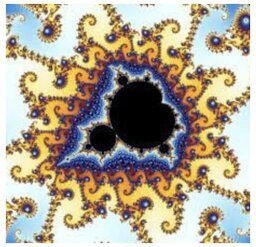My kids love playing Clash of Clans, a simulated little world with villages, resource production, armies, battles, and a smart way to get you back in again and again. (I read somewhere they make more than 1 million USD per day through virtual item sales!). Their favorite character is the Barbarian King. Let’s imagine for a minute that one day this cute little guy (for reasons unclear) becomes conscious in the simulation and starts to get curious about the rules around him.

Given he is smart enough, he could figure out some interesting aspects about his world. For example, following the trajectories of cannonballs, he could derive something similar to Newton’s laws of gravitation. Or like a human quantum physicist, he could try to find the fundamental building blocks of the world and would indeed discover the quantized nature of the pixel-grid he is living in. Even the time is quantized in his world, forcing everything into a lockstep.
But he could do even more: He could detect some overarching patterns in his world that result from underlying programming code idioms, such as the concept of for-loops, variables, or if-then conditions. Inspired by this, he could develop his own programming language.
This language would not only be useful to explain the world he is living in, but the Barbarian King could also use the language to simulate new worlds that exist independent of the world he was born into, and do things that go far beyond what is observable in his universe.
Imagine the same applies to our universe. Imagine it is actually programmed with some language we discover when we closely observe it, which we call mathematics. This language allows us to create infinitely complex and wonderful worlds that exist only in the mathematical domain, such as the Mandelbrot set below:

The mystic connection between reality and the mathematical world could be explained by assuming that we live in a simulation and math is the programming language of this simulation, which was discovered by us by observing patterns of reality.
Our real-world is just one instantiation of all the possible worlds that could be created with the language of mathematics, just as Barbarian King’s world is just one of many games that can be created with a programming language.
Let’s take things further: What do we know about our simulators? And can we communicate with them?
First of all, almost all games we create heavily borrow from the real world. Clash of Clans is just a simple casual game, but it still comes with landscapes, animals, water, weather, physics, and so on. You would expect that our universe is also roughly based on the simulator’s world, probably a grossly simplified version. Things like time, space, matter, light, gravity likely also exist on the level of reality.
Also, it looks like our simulation is not constantly fiddled around with. It seems a set of rules (physics) and initial conditions were set up and things have been moving along ever since. Unless the simulators are extremely careful, we would observe results of this fiddling around, and things would not fit into a unified physical description.
Maybe our universe is some kind of screensaver. It was created for aesthetic purposes and the simulation is just running along (note that our timescale by no means has to match timescales in the real world).
Maybe nobody is actually looking closely at the screensaver right now. After all, all these galaxies might be pretty to look at for a while but get quite boring over time. Our universe would not be all that interesting without life. A few different types of stars, galaxies, some black holes, gravity doing its trick – it gets old after a while.
Life might be an unintended side-product of the simulation. As it is happening on such a tiny scale compared to the galaxies out there, it most probably got overlooked. Evolution by itself is not a mystery. Randomness and selection lead to a crazy variety of forms and functions, which makes the world more interesting. But the real mystery is how evolution could create consciousness. Maybe this happens all the time, but maybe not.
Maybe our creators would be as puzzled as I would be to detect consciousness in the Barbarian King. It might be a good idea to find a way to let our simulators know we exist, so they don’t accidentally switch off the program. But how?
I think it is easy. The simulators can obviously observe the results of the program, but similar to us looking at a Mandelbrot set, they would not be able to check all of the billions of little spiral arms for something interesting.
We would have to change the universe at a macro level to make sure we get noticed by our simulators. Life has already painted one planet green. With a bit of space colonization, we could paint many other planets into colors that would not occur without life. If we are really good at what we do, we could even use planets as pixels and paint a picture across the galaxies. Obviously not easy to coordinate, especially as all parts of the universe are constantly moving.
But with enough time and resources, I don’t see a reason why it should not be possible to paint something on the macro-scale of the universe that would make the programmers out there look at their screensaver and say “gee, I wonder where this strange new pattern comes from… probably a bug…”.
As always, we are still hiring, so check out some of our latest openings, or join our Talent Community to stay up to date with what’s going on at Delivery Hero and receive customized job alerts!


